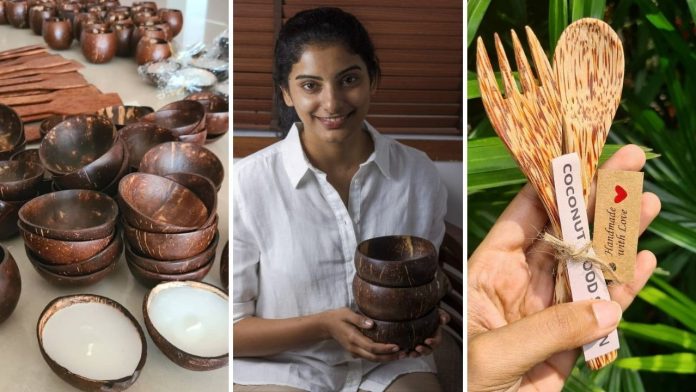
Thenga – A startup to turn Coconut Shells to Kitchenware
Date:

Share post:
Kerala – ‘the land of coconut trees’ produces almost 45% of India’s coconuts, with some 92% of total production lying in the other southern Indian states. This versatile crop is consumed on daily basis in every Keralian household but the shells are often discarded if not used as activated charcoal or burned as a fuel. In earlier days, many of the artisans in Kerala utilized the shells to make ladles for serving food but gradually these products lost their value resulting in fewer and fewer artisans practicing this craft nowadays. As the popularity of these products waned, artisans who made them have shifted to manufacturing handicrafts and jewelry.
Maria Kuriakose, a business administration post-graduate from Thrissur noticed the wastage of the coconut shells when she visited a coconut oil mill in the district. She knew that coconut shell is a sustainable and long-lasting substitute for plastic, particularly for making kitchen items. Unlike steel and plastic kitchenware, this easy to decompose item can be conveniently broken into smaller parts and mixed with soil. To start earning from this waste, she launched a homegrown brand named Thenga, which also means coconut in Malayalam.

After spending seven years in Mumbai for her studies and job, Maria left her corporate job in 2019, as she always wanted to work at a place that empowers the underprivileged. Maria joined a social enterprise that worked with women in slums to make sustainable sanitary pads but a year later decided to settle in her home state – Kerala to dedicate herself to Thenga, her start-up to recycle coconut shells into eco-friendly items of everyday use. She started speaking to artisans and experts who were making its byproducts and spent a few months understanding how the shells were sorted and the final product is made. She realized that coconut shell products require certain machinery to scrub the outer and inner parts of the shell and give it a smooth finish.
Initially, she did not want to spend a lot to run a trial for her new business and could not afford to buy high-end machinery. Her retired father provided help at this phase of her business. Kuriakose Varoo, a 65-year old retired mechanical engineer replicated the design of the standing wheel by going through the design videos on YouTube. Within a few days, he was able to recreate the sanding machines that smoothen the inner and outer parts of the coconut shell. He made different fittings such as a buffer and disc sander by recycling handheld drill in their home. Her mother, Jolly Kuriakose also helped her by collecting coconut shells of different sizes from their backyard and a nearby oil mill.With her help, Maria started preparing samples of Thenga and approached stores specializing in eco-friendly products.

Once the orders started pouring in, the toughest challenge Maria had to face is finding the right size of shells and make the bowls. Her parents helped all through to complete orders but gradually she felt, it was a hassle to manufacture all the products at home, and wanted to spend time on marketing the business and innovating new products. To find a solution, she reached out to several artisans in Thrissur, Kottayam, and Wayanad who were making ladles from coconut shells. These artisans were still practicing this craft but did other odd jobs too to earn a livelihood. Primarily, 10 artisans were on boarded to sandpaper, varnish, and transform the shells into designer smoothie bowls, planters, candle holders, cups, and cutlery. They take care of sourcing the raw materials too along with Maria because it’s not quite easy to find shells of the right dimension through piles of discarded coconut shells.
The business has sold over 8,000 products to date. By the end of last year, Thenga introduced four sizes of bowl, the smallest one with a capacity of 150 ml priced at Rs. 250 and the largest sized 900 ml priced at Rs. 950. She considered expanding her business after started selling on e-commerce sites, such as Amazon and Flipkart. The startup is currently producing around 15-20 products, which include coconut bowls, spoons, forks, and cups. The brand uses natural products which are free from chemicals for their cutlery. To ensure that her products are zero-waste natural products, Maria has trained her artisans to use coconut oil as a substitute for varnish for the final coat of polish.

Thenga has started exporting coconut products to the U.S.,U.K., and United Arab Emirates (UAE) with the help of their partners. Now, Thenga has a total of 15 employees including 12 coconut artisans for the production of different materials. They source their raw materials from four oil mills with whom they have signed agreements.
The startup has reached a higher customer base during the pandemic as people tried more sustainable alternatives to return to traditional, healthier ways of living. Thenga plans to reach lakhs of customers from the present customer base of 3,000 people. They planned to expand their range of products by manufacturing coconut shell toys and containers. The startup serves the noble purpose of spreading more sustainable ways of living while providing better job opportunities for the artisans of Kerala.
